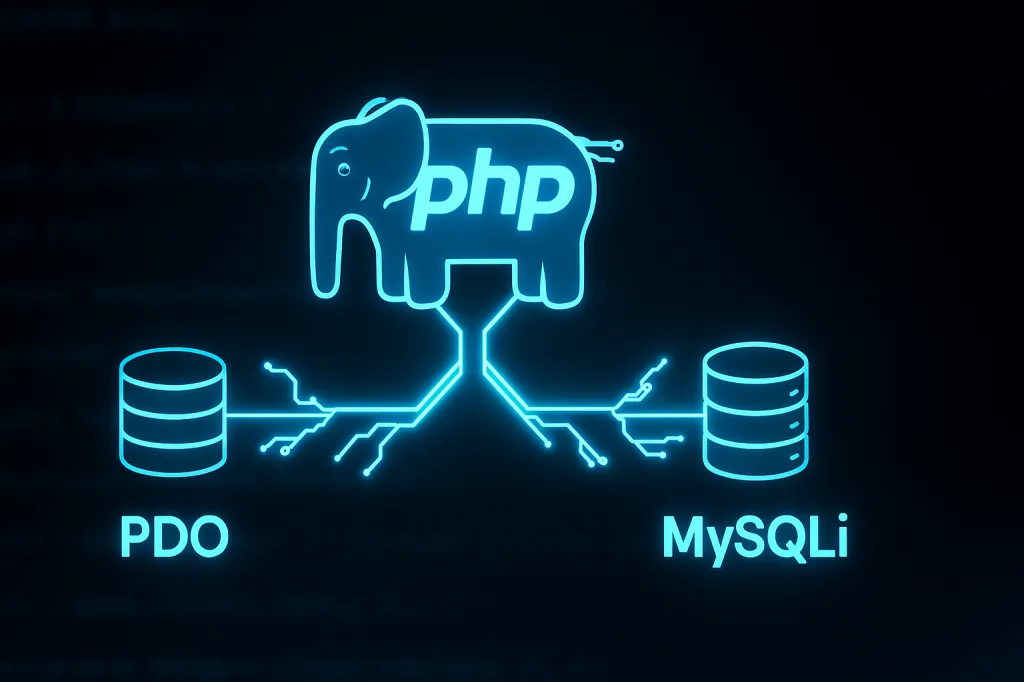Introduction: The Database Connection War in the World of PHP
For PHP developers, connecting to a MySQL database is a fundamental part of building web applications. But when it comes to how to connect, we are often faced with two popular options: PDO (PHP Data Objects) and MySQLi (MySQL Improved). The ever-present question is, "Which one should I use?" This article will provide an in-depth comparison of both to help you make the best choice for your project.
What is MySQLi?
MySQLi, or the MySQL Improved Extension, was created to replace the old, deprecated mysql_* functions. Its main feature is that it is designed specifically to work with the MySQL database, supporting its newest features to the fullest extent.
MySQLi offers two coding styles:
- Procedural: Similar to the original
mysql_*functions, making it easy to learn for those familiar with the old way. - Object-Oriented: The modern and preferred approach for current development practices.
MySQLi Code Example (Object-Oriented Style):
//-- Create connection
$mysqli = new mysqli("localhost", "username", "password", "database");
//-- Check connection
if ($mysqli->connect_error) {
die("Connection failed: " . $mysqli->connect_error);
}
//-- Perform query
$sql = "SELECT id, firstname, lastname FROM guests";
$result = $mysqli->query($sql);
if ($result->num_rows > 0) {
// output data of each row
while($row = $result->fetch_assoc()) {
echo "id: " . $row["id"]. " - Name: " . $row["firstname"]. " " . $row["lastname"]. "<br>";
}
} else {
echo "0 results";
}
$mysqli->close();
What is PDO?
PDO, or PHP Data Objects, is not just an extension but a database Abstraction Layer. This means PDO provides a consistent interface that allows developers to connect and work with various types of databases (e.g., MySQL, PostgreSQL, SQLite, MS SQL Server) using the same set of functions.
The greatest strength of PDO is its flexibility. If you decide one day to switch from MySQL to PostgreSQL, you would barely need to change your query code at all—only the connection string.
PDO Code Example (Using Prepared Statements for Security):
$servername = "localhost";
$username = "username";
$password = "password";
$dbname = "database";
try {
//-- Create connection
$conn = new PDO("mysql:host=$servername;dbname=$dbname", $username, $password);
//-- Set the PDO error mode to exception
$conn->setAttribute(PDO::ATTR_ERRMODE, PDO::ERRMODE_EXCEPTION);
//-- Perform query using a prepared statement
$stmt = $conn->prepare("SELECT id, firstname, lastname FROM guests WHERE lastname = :lastname");
$stmt->execute([':lastname' => 'Smith']);
//-- Set the resulting array to associative
$stmt->setFetchMode(PDO::FETCH_ASSOC);
foreach($stmt->fetchAll() as $row) {
echo "id: " . $row["id"]. " - Name: " . $row["firstname"]. " " . $row["lastname"]. "<br>";
}
} catch(PDOException $e) {
echo "Connection failed: " . $e->getMessage();
}
$conn = null;
Head-to-Head Comparison: PDO vs. MySQLi
| Feature | PDO | MySQLi |
|---|---|---|
| Database Support | Supports 12+ different database drivers. | MySQL/MariaDB only. |
| API Style | Object-Oriented only. | Supports both Object-Oriented and Procedural. |
| Named Parameters | Supported (e.g., :name), which improves readability. |
Not supported (uses ? placeholders only). |
| Error Handling | Highly flexible, especially with Exceptions (try/catch), which is the modern standard. | Requires manual checks at each step. |
| Performance | The difference is negligible and should not be the deciding factor for most applications. | |
Conclusion: Which One Should You Choose?
For new projects or for development that requires flexibility and modern standards, I strongly recommend choosing PDO as your first option. The main reasons are:
- Flexibility: If you ever need to switch databases in the future, PDO will make your life much easier.
- Cleaner Code: The use of Named Parameters and Exception Handling makes your code more readable and easier to debug.
- Security: While both support Prepared Statements to prevent SQL Injection, binding variables by name (Named Parameters) in PDO often results in less complex and less error-prone code.
However, if you are 100% certain your project will only ever use MySQL and your team is more familiar with MySQLi, choosing it is by no means a mistake.





